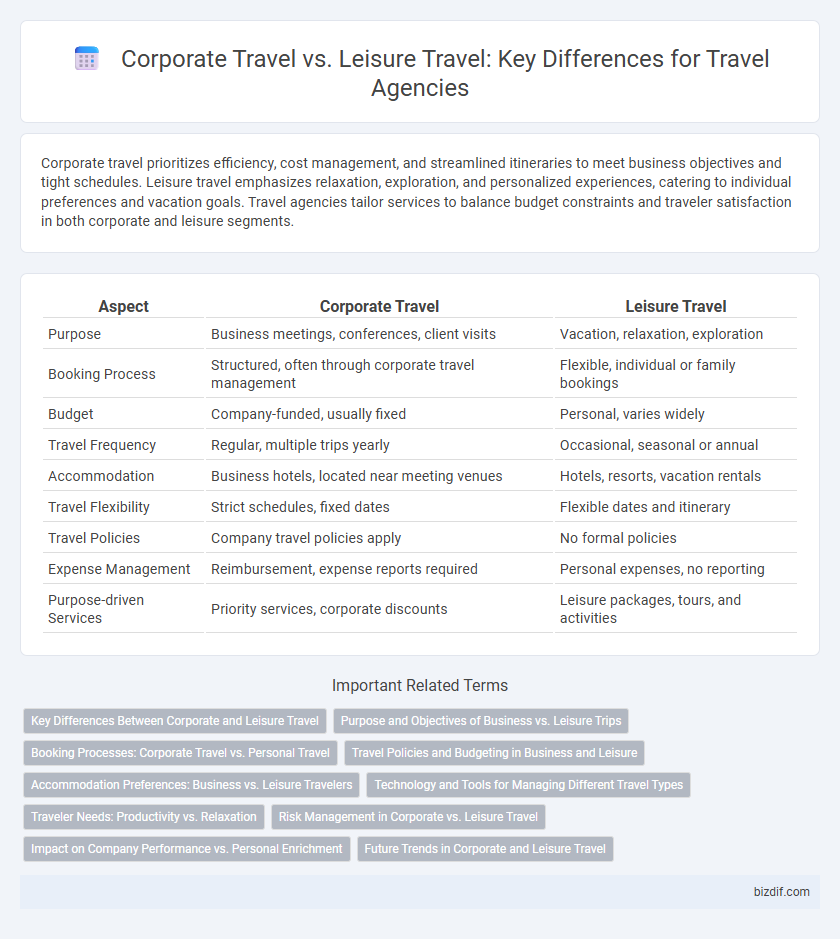Corporate travel prioritizes efficiency, cost management, and streamlined itineraries to meet business objectives and tight schedules. Leisure travel emphasizes relaxation, exploration, and personalized experiences, catering to individual preferences and vacation goals. Travel agencies tailor services to balance budget constraints and traveler satisfaction in both corporate and leisure segments.
Table of Comparison
| Aspect | Corporate Travel | Leisure Travel |
|---|---|---|
| Purpose | Business meetings, conferences, client visits | Vacation, relaxation, exploration |
| Booking Process | Structured, often through corporate travel management | Flexible, individual or family bookings |
| Budget | Company-funded, usually fixed | Personal, varies widely |
| Travel Frequency | Regular, multiple trips yearly | Occasional, seasonal or annual |
| Accommodation | Business hotels, located near meeting venues | Hotels, resorts, vacation rentals |
| Travel Flexibility | Strict schedules, fixed dates | Flexible dates and itinerary |
| Travel Policies | Company travel policies apply | No formal policies |
| Expense Management | Reimbursement, expense reports required | Personal expenses, no reporting |
| Purpose-driven Services | Priority services, corporate discounts | Leisure packages, tours, and activities |
Key Differences Between Corporate and Leisure Travel
Corporate travel prioritizes efficiency, strict itineraries, and cost control to align with business objectives, often involving multiple destinations in a short period. Leisure travel focuses on relaxation, flexibility, and personal enjoyment, with travelers spending extended time at destinations to explore local culture and attractions. Corporate trips typically involve booking through travel management companies for compliance and expense tracking, while leisure travel is frequently arranged independently or through consumer-focused agencies.
Purpose and Objectives of Business vs. Leisure Trips
Corporate travel primarily focuses on efficiency, productivity, and business objectives such as attending meetings, conferences, and client engagements to drive company growth. Leisure travel centers on relaxation, exploration, and personal enjoyment, often involving vacation destinations, sightseeing, and cultural experiences to rejuvenate and entertain. Business trips emphasize time management and cost-effectiveness, whereas leisure travel prioritizes flexibility and experience enrichment.
Booking Processes: Corporate Travel vs. Personal Travel
Corporate travel booking processes often require streamlined approval workflows, integration with expense management systems, and adherence to company travel policies, ensuring compliance and cost control. Leisure travel bookings tend to be more flexible and spontaneous, allowing travelers to customize itineraries freely without rigid approval steps. Advanced booking tools for corporate travel optimize group arrangements and frequent flyer programs, whereas personal travel platforms emphasize user-friendly interfaces and personalized offers.
Travel Policies and Budgeting in Business and Leisure
Corporate travel requires strict adherence to travel policies that prioritize cost efficiency, preferred vendor usage, and compliance with company budgets, ensuring controlled expenses and seamless reimbursement processes. In contrast, leisure travel allows more flexibility in spending, with travelers typically managing personal budgets without mandatory policy constraints, enabling spontaneous and varied travel experiences. Effective travel agencies tailor their services to accommodate these differing needs, optimizing corporate travel management systems while offering personalized leisure travel options.
Accommodation Preferences: Business vs. Leisure Travelers
Business travelers prioritize accommodations with convenient locations near office hubs, reliable Wi-Fi, and amenities such as meeting rooms and express check-in services, optimizing efficiency and productivity. Leisure travelers seek accommodations offering comfort, scenic views, and recreational facilities like pools and spas to enhance relaxation and enjoyment. Understanding these distinct preferences helps travel agencies tailor lodging options to meet the specific needs of corporate versus leisure clients.
Technology and Tools for Managing Different Travel Types
Corporate travel relies heavily on advanced expense management software, automated booking platforms, and real-time itinerary tracking tools to optimize efficiency and control costs. Leisure travel benefits from personalized recommendation engines, user-friendly mobile apps, and dynamic packaging technologies that enhance customer experience and simplify trip planning. Both travel types increasingly leverage AI-driven analytics and integrated communication systems to streamline operations and improve decision-making.
Traveler Needs: Productivity vs. Relaxation
Corporate travel prioritizes efficiency and productivity, offering streamlined booking, flexible itineraries, and access to business amenities like meeting rooms and reliable Wi-Fi. Leisure travel emphasizes comfort and relaxation, with curated experiences, leisure activities, and personalized accommodations to enhance rest and enjoyment. Travel agencies must tailor services to meet these distinct needs, optimizing both business productivity and vacation rejuvenation.
Risk Management in Corporate vs. Leisure Travel
Corporate travel involves comprehensive risk management strategies including real-time monitoring, emergency response plans, and compliance with corporate policies to ensure employee safety and minimize business disruptions. Leisure travel risk management often emphasizes traveler awareness and insurance options, focusing on personal safety and flexibility in response to unforeseen events. The level of risk mitigation in corporate travel typically surpasses leisure travel due to higher stakes involving employee welfare and company liability.
Impact on Company Performance vs. Personal Enrichment
Corporate travel directly influences company performance through enhanced client relationships, efficient project management, and expanded business opportunities. Leisure travel contributes primarily to personal enrichment by promoting relaxation, cultural exposure, and mental well-being. Balancing corporate and leisure travel optimizes employee satisfaction and drives overall organizational success.
Future Trends in Corporate and Leisure Travel
Emerging technologies such as AI-driven personalization and virtual reality are shaping future trends in corporate travel by enhancing efficiency and traveler experience. Leisure travel is expected to see increased demand for sustainable and immersive experiences, driven by growing environmental awareness and digital nomadism. Data analytics and mobile platforms will play crucial roles in customizing travel services and streamlining logistics for both corporate and leisure segments.
Corporate Travel vs Leisure Travel Infographic

 bizdif.com
bizdif.com